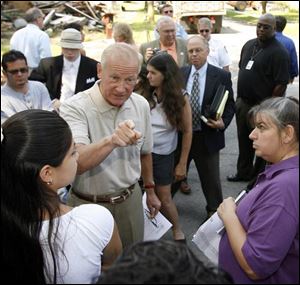
Mayor gives pep talk at model block event
7/25/2006
Carty Finkbeiner talks with residents at Page and Locust. The city tore down a house on Locust earlier yesterday.
Mayor Carty Finkbeiner mixed scolding with inspirational pep talk yesterday as he started a two-week "model block" effort in a 24-block area in North Toledo.
As the third such effort of Mr. Finkbeiner's current term, city agencies concentrate efforts such as alley cleaning, tree trimming, police enforcement, and nuisance inspection to spruce up an area.
The mayor directed pointed remarks toward a group of young black men who had joined other residents, city officials, and news reporters and photographers for the news conference in front of 1921 Locust St., which had been demolished earlier in the day.
Calling them "brothers," Mr. Finkbeiner challenged the men to seek jobs with the city's sanitation department. He said they'd be paid $37,000 a year and would be done every day at 2 p.m., provided they can arise at 6 a.m. "You can't be staying up until 2 o'clock in the morning," he told them.
"There is an alternative to living on the streets or going to prison. It's called work," the mayor said. "I'm tired of seeing African-American young men I've known when they were 16 ending up behind bars."
Asked by one of the men if a felony conviction disqualified him from city employment, Mr. Finkbeiner said, "You deserve a second chance, but you can't keep going back."
Christopher Matthews, 27, said he was convicted of felonious assault. He said he has applied for a city job repeatedly since last year, has been through an interview, and has been told his background check was being reviewed in the law department.
According to Lucas County Common Pleas Court records, Matthews pleaded guilty in 1999 to felonious assault for participating in a home invasion in Swanton Township. He was sentenced to five years in prison and was released into community control in March, 2003, ending March 1, 2006.
Matthews said he came to the news event because he heard the mayor was there. "I was more or less trying to see if I could go through a couple of different conduits to get the process sped up," he said.
Later, in response to the mayor's invitation, 17 men, including Matthews, went to the mayor's office at 1:30 p.m. to fill out applications for jobs in refuse collection, grass-cutting, and leaf collection, according to Brian Schwartz, spokesman for the mayor.
Amanda Burgess, 59, who lives across Locust from the demolished house, said it detracted from the cared-for homes in the community.
"It's been empty for a while. The landlord didn't care and just let it go," she said.
On related subjects, the mayor declined to endorse the so-called "minimum habitability" legislation set for a vote today by Toledo City Council.
The ordinance would require a seller to have an inspector certify that a house meets living standards before it can be sold.
Terry Glazer, executive director of Lagrange Development Corp., contends the ordinance would protect unsophisticated home buyers and lead to improved housing quality.
The Property Rights Coalition, a group made up of real estate sellers and developers, says the law would be difficult to enforce and would harm the Toledo housing market.
The model block zone, bounded by Cherry, Noble, Peck, and Mulberry streets, is a few blocks from the center of rioting that occurred Oct. 15 when a neo-Nazi group tried to march through the neighborhood.